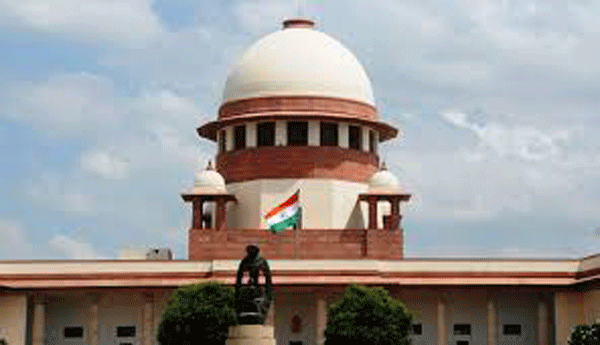Amba Charan Vashishth
The Congress bubble to impeach Chief Justice of India, Justice Deepak Mishra, got punctured on May 8, 2018 in the Supreme Court. Two Congress Rajya Sabha MPs, Pratap Singh Bajwa and Amee Yagnik, had moved the Supreme Court (SC) challenging Rajya Sabha chairman Venkaiah Naidu’s rejection of an opposition motion seeking the removal of the CJI. They were left with no option but to withdraw the petition. After this the court dismissed the petition as withdrawn.
The Congress and six other opposition parties had last month moved a motion in the Rajya Sabha for the removal of Chief Justice Dipak Misra alleging five grounds of “misbehaviour”. However, Naidu rejected the notice holding that the allegations lacked merit.
It is not clear why only Congress seemed disturbed by Naidu’s order and not its other five associates.
The provocation for the impeachment move apparently looked not legal or constitutional but purely political. It seems to have been triggered by the CJI’s intention to take up the Ayodhia Ram Mandir-Babri masjid case on priority and decide early.
Dushyant Dave, who was the counsel for the petitioner in the judge Loya case, had questioned the “hurry” of the court in deciding the Ayodhya dispute.
The most interesting coincidence is that on 15 January this year four senior-most SC judges after the CJI — Justices J Chelameswar, Ranjan Gogoi, Madan B Lokur and Kurian Joseph — addressed a press conference questioning the CJI allocating the cases to the “junior” judges.
On the same afternoon, one of the four judges was reported to have met CPI leader and Rajya Sabha MP D Raja. Politics for the Chief Justice’s impeachment appears to have got impetus from there.
It remains unexplained why a judge should be interested to hear (or not hear) a particular cases/s.
It was for the first time in the history of independent India that such a motion against the Chief Justice of the Supreme Court had been initiated. Also, no SC judge has even been impeached.
Article 124 (4) of the Constitution governing impeachment says “Judge of the Supreme Court shall not be removed from his office except by an order of the President passed after an address by each House of Parliament supported by a majority of the total membership of that House and by a majority of not less than two-thirds of the members of that House present and voting has been presented to the President in the same session for such removal on the ground of proved misbehavior or incapacity.”
It is only on the ground of “proven misbehaviour or incapacity” and no other ground on which impeachment proceedings can be taken up by either House of Parliament. This vital element was missing in the opposition motion for impeachment.
It is interesting to note that on the one hand, the Congress led opposition, which did not allow both houses of Parliament to function during budget session, was willing to go peaceful and not on other important matters concerning public interest, decided to file a petition signed by 64 members in the Rajya Sabha and not in the Lok Sabha where opposition is numerically weak.
Rajya Sabha Chairman M Venkaiah Naidu rejected the notice given by opposition parties led by the Congress for impeachment of CJI Dipak Misra citing lack of substantial merit in it. Naidu, according to reports, held extensive consultations with top legal and constitutional experts, including former chief justices and judges, before taking the decision.
In his order Venkaiah Naidu said that he had detailed personal conversation on all the aspects arising from the notice and had considered each of the allegations made in it individually as well as collectively. “Based on all this, I have come to the conclusion that this motion does not deserve to be admitted…On careful analysis and reflection, I find there is virtually no concrete verifiable imputation”.
“We cannot allow any of our pillars of governance to be weakened by any thought, word or action,” Naidu said. The RS that he was “satisfied that admission of this Notice of Motion is neither desirable nor proper”.
“In passing, I am constrained to observe that in this matter, the well established parliamentary customs and conventions as have been delineated in para 2.2 of the Handbook for Members of Rajya Sabha have been disregarded,” Naidu said. “I have considered the material contained in the Notice of Motion and reflected upon the inputs received in my interaction with legal luminaries and constitutional experts, I am of the firm opinion that the Notice of Motion does not deserve to be admitted. I refuse to admit the Notice of Motion,” he said.
“In passing, I am constrained to observe that in this matter, the well established parliamentary customs and conventions as have been delineated in the paragraph 2.2 of the Handbook for Members of Rajya Sabha have been disregarded. This provision prohibits publicity of any Notice submitted by a member till it has been admitted by the Chairman and circulated to the members.
In the instant case immediately after submitting the Notice to me on 2oth April, 2018, Members addressed a press conference and shared the statements contained in the Notice which included some still unsubstantiated charges against the CJI. This act of Members of discussing the conduct of the CJI in the press is against propriety and parliamentary decorum as it denigrates the institution of CJI. I am also aware that there has been a spate of statements in the press that seem to vitiate the atmosphere. I thought I should, therefore, expedite my decision and end needless speculation”.


